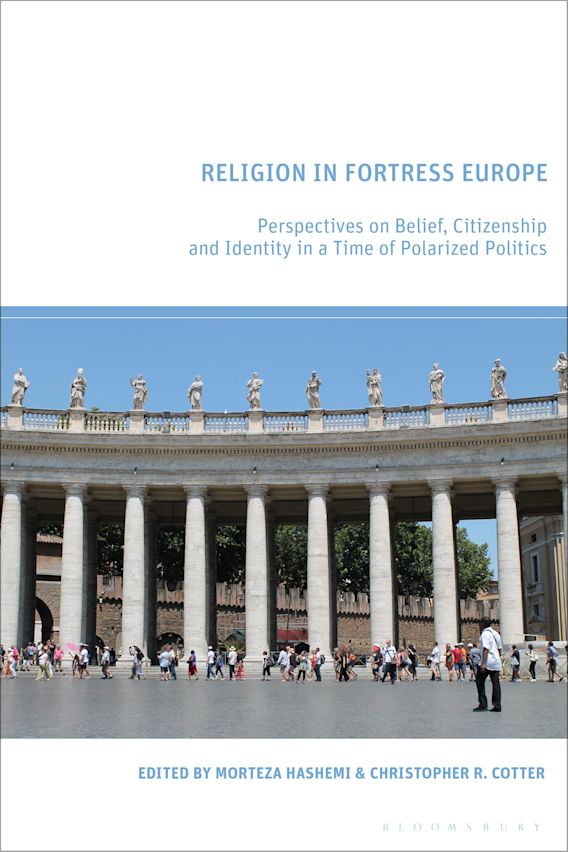By Chris Cotter
A couple of weeks ago, I was delighted to receive my complimentary copies of Religion in Fortress Europe: Perspectives on Belief, Citizenship, and Identity in a Time of Polarized Politics (Bloomsbury, 2023).
The idea for the book was conceived in late 2019 with my co-editor Morteza Hashemi when we were both coming to the end of Leverhulme Early Career Fellowships at the University of Edinburgh. Despite the Covid-19 lockdowns getting understandably in the way of our May 2020 in-person workshop, we valiantly pivoted online and persevered through the project, completing our introductory chapter around the outbreak of the current conflict in Ukraine. In a nutshell, we wanted to assemble a collection of scholars to look at the entanglement of religion in contemporary, often quite heated, debates around borders, migration, multiculturalism, and national identity in contemporary (post-Brexit) Europe. Little did we know how much would happen between final submission and publication, with a new First Minister of Scotland (Humza Yousaf, a Scot of Pakistani descent, who identifies as Muslim), a new Prime Minister of the United Kingdom (Rishi Sunak, an Englishman of Punjabi descent, who identifies as Hindu), and intense debates surrounding UK Government policy towards stopping small boats crossing the English Channel. These are only a few UK-related events from recent months which speak to the timeliness of this volume, which I’ll introduce more now.
As editors, working on our own projects involving marginalized communities in regions on the edges of the UK, itself on the edges of Europe in many ways, we realised that there has been a systematic blindness to the everyday experiences of various religious communities across the continent. Perhaps this is due to a continued influence of the secularization thesis on much of Western scholarship (at least, outside of critical religious studies)? As a corrective, we have assembled a volume consisting of chapters on the attitudes, experiences, challenges, hopes, fears, contributions, and encounters of religion-related groups across Europe, and the official policies that impact upon their lives.
Although the volume focuses upon religion in general, a higher number of our contributions focus upon Islam. We felt justified in this because of the central place of Islam in discourses of otherness in Europe and beyond, and of course the experiences of migration to Europe of Muslims from the Middle East, North Africa, and the Indian subcontinent since the end of the colonial era, and particularly the Second World War. This background is augmented by the reactionary development of the idea of “Fortress Europe”, which is explored in Mike Slaven’s early chapter in the book. As Matthew Carr has noted,
At no time in history have so many people attempted to cross international borders without authorization, and at no time have so many governments gone to such lengths to try to stop them. All this raises crucial questions about human rights and global inequality, about security, migration and the obligations of governments to refugees and non-citizens in a century that is likely to be dominated by new global mobility. To some extent, therefore, the confrontation between Europe and its unwanted intruders is specific to Europe; but it is also a reflection of a much wider phenomenon. (Carr 2012, 7)
Our book examines this much wider phenomenon through seven case studies of specific religion-related communities in specific nations, as well as some more sweeping analyses.
The seven case studies are as follows:
- John Holmwood explores three contentious cases surrounding schooling in Birmingham in England, which are each representative of what Holmwood dubs a ‘muscular liberalism’ against minorities via the 2010 Equality Act.
- Morteza Hashemi focuses upon Scottish Shia Muslim health activists who, he argues, are reclaiming their problematized bodily identity through, among other things, blood donation to fellow Europeans.
- Martina Loth’s chapter turns to Germany, and the identity struggles of young Alevis – a persecuted minority among majority Sunni migrants from Turkey – and the redefinition of Alevism.
- Daan Beekers explores populist politics and the repurposing of church buildings in the Netherlands, identifying an antagonistic ‘identitarian Christianity’ and the mobilization of Christian heritage.
- Martin Bürgin investigates controversies in Swiss media surrounding an incident where Muslim students refused to shake hands with a female teacher and examines how the reaction of political figures paralleled nineteenth-century culture wars.
- Hazel O’Brien observes a recent revival of anti-minority rhetoric in Ireland, which is uncharacteristic of a young nation without a history of far-right populism, and questions the incorporation of ethnic and religious diversity into dominant Irish identity.
- Tuomas Äystö explores the anti-migration and anti-Muslim rhetoric of two Finnish political parties, entangled in a nationalist narrative of Finland as a Christian nation opposed to various pluralist positions in identity politics.
The book then concludes with two chapters of broader comparative and analytic scope from two giants of the field, Nasar Meer and Grace Davie. We’re immensely grateful to all who contributed, and hope that you have enjoyed this taster of what is explored in what I hope I have demonstrated to be an immensely timely book. Happy reading!

